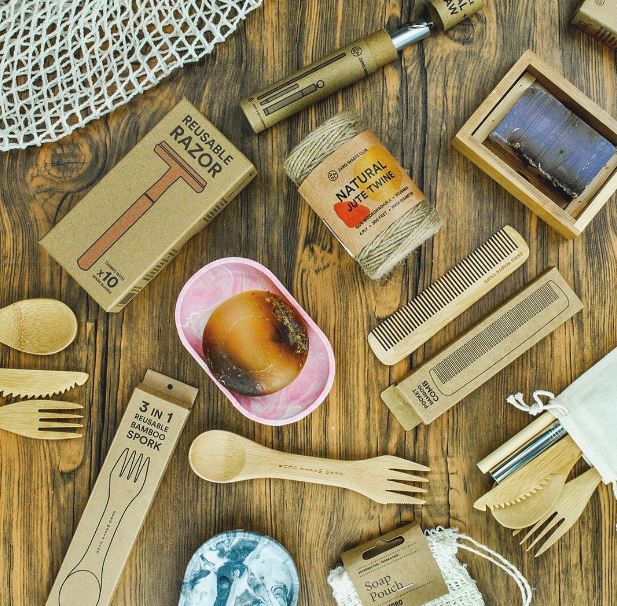
Mar 26 2021
Opinion: The Importance of Plastic Free Living
Hi! I’m Grace, a working Mum with a passion for sustainability. Upset by the long term damage caused by disposable items and our society’s throw-away culture, I’m striving to live as sustainably as possible. In doing so, I hope to inspire, educate and encourage other people to reduce their waste through sharing my experiences.
We have all seen images of plastic in nature: birds and wales with stomachs full of plastic they have swallowed thinking it was food. We’ve heard statistics about how much plastic is in the ocean. We have been shocked to find out that many items which we would not have thought contained plastic, actually do. It can feel all too overwhelming. And it is. However, that is no reason to not begin making positive changes in your life and start working towards consuming less.
Plastic is an incredibly useful thing. It is not necessarily bad, as there are bio-plastics that can be made to decompose without polluting. However, the way and amount of plastic that is used today is totally unsustainable, not mention the way it is disposed of (or not disposed of). Plastic is everywhere. It is convenient, cheap and easily accessible. But it is NOT the answer.
If you look back over the past 100 or so years, at the way our Grandparents or Great Grandparents lived, plastic did not play a huge (if any) role in their lives. They shopped locally, they visited bulk stores, they cherished what they owned, repaired what they had and made things last.
In 1907 Bakelite was invented, and soon made mass produced plastic products possible. Fast forward to today and we are living in an incredibly fast paced consumer driven culture where we are made to think that success and happiness is achieved by having more new, expensive stuff. It does not have to be this way.
There is a counter culture emerging. A culture where people are harking back to the ways our grandparents lived. A need for lasting quality products that can be repaired. Through seeing the impact of plastics in the seas, destruction of natural habitat and pollution, people are realising that ‘success’ is not about how much you consume, but actually how little you waste.
Plastic is an incredibly useful thing. It is not necessarily bad, as there are bio-plastics that can be made to decompose without polluting. However, the way and amount of plastic that is used today is totally unsustainable, not mention the way it is disposed of (or not disposed of). Plastic is everywhere. It is convenient, cheap and easily accessible. But it is NOT the answer.
If you look back over the past 100 or so years, at the way our Grandparents or Great Grandparents lived, plastic did not play a huge (if any) role in their lives. They shopped locally, they visited bulk stores, they cherished what they owned, repaired what they had and made things last.
In 1907 Bakelite was invented, and soon made mass produced plastic products possible. Fast forward to today and we are living in an incredibly fast paced consumer driven culture where we are made to think that success and happiness is achieved by having more new, expensive stuff. It does not have to be this way.
There is a counter culture emerging. A culture where people are harking back to the ways our grandparents lived. A need for lasting quality products that can be repaired. Through seeing the impact of plastics in the seas, destruction of natural habitat and pollution, people are realising that ‘success’ is not about how much you consume, but actually how little you waste.
There is now an increasing awareness of how unsustainably we are living, and with that comes innovation. Plastic free products are now becoming readily accessible. Refill shops are popping up all over the place and consumers are being more mindful of what, why, and how they are consuming.
When you first begin researching single use, disposable products, it is obvious that this is wasteful. It is a waste of resources and energy to create something which is only used for a very short period of time. However, it goes deeper than that. The disposal of these items also requires resources and energy. But that doesn’t mean that they have been correctly disposed of. Sending things to landfill is a form of ‘disposal’ but that doesn’t fix the problem, it adds to it. We need to stop.
When you first begin researching single use, disposable products, it is obvious that this is wasteful. It is a waste of resources and energy to create something which is only used for a very short period of time. However, it goes deeper than that. The disposal of these items also requires resources and energy. But that doesn’t mean that they have been correctly disposed of. Sending things to landfill is a form of ‘disposal’ but that doesn’t fix the problem, it adds to it. We need to stop.
We can begin by looking at sustainable alternatives to what we are consuming. Plastic free, zero waste products aim to do this. They have the opportunity to completely change this ‘product life cycle’. These products might not be cheaper for the consumer, but they will definitely benefit the earth.
For example, think about those yellow and green sponges you buy for doing the dishes. They’re plastic. You use one for a couple of weeks, maybe a month. Maybe you even give it a second life for cleaning the shower once it has finished in the kitchen. But then, it goes in the bin. It might be out of sight, out of mind. But it still exists somewhere breaking down into various toxic by-products.
Human health is dependent on the health of the Earth. We damage the soil ecosystem and everything suffers. Switching to a home compostable sponge made from natural materials means that once it has finished its useful life it can be composted and returned to the earth. It will decompose, and in doing so, it won’t release polluting chemicals or microplastics while sitting in landfill.
As consumers, we have SO much power to create positive change, purely by voting with our money. Consumer choice really is one of the only effective forms of activism understood and acted upon by the capitalist world view. By putting our money behind companies who prioritise the planet and people over profit, we are saying that we support these companies who consider their impact as a brand and want to do better.
As consumers, we have SO much power to create positive change, purely by voting with our money. Consumer choice really is one of the only effective forms of activism understood and acted upon by the capitalist world view. By putting our money behind companies who prioritise the planet and people over profit, we are saying that we support these companies who consider their impact as a brand and want to do better.
By choosing ethically sourced and environmentally responsible goods you are also diverting money and profits away from companies who are damaging the earth.
Your choice is such an incredible power to have.
Your choice is such an incredible power to have.

